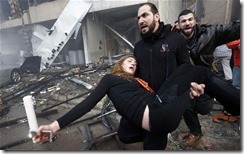The fates of the modern states of Lebanon and Syria are inextricably linked. It is important to read their history not just as was done conventionally that is Syria never fully recognizing Lebanon as an independent state but also the reverse, as Lebanon, or particular segments of the Lebanese political establishment involving and using Syria for its own survival as a small state. During the first half of the twentieth century and until the 1970s, Muslims and pan-Arabists of all creed had difficulty recognizing that Lebanon should be a separate state as such. The civil war forced the Christians to realize that they needed help from the Syrians first when the Phalangists risked defeat against pro Palestinian forces around the second half of the 1970s, second when a section of the Christian establishment had allied with the Syrian help after 1982 Israeli invasion, and third after the Taif agreement of 1982. Even Michel Aoun the staunchest opponent to Taif and the Syrian regime realized that such categorical attitude was detrimental to Lebanon’s strategic advantage.
In the beginning of the 1990s, and after bitter clashes with the Syrian regime, it was Hizbullah’s turn to realize that they could not survive and strive as a resistance force without Syrian geographical strategic positioning, as well as security and logistical support. This brought them closer to other political groups in the country during the 1990s. Then events unfolding after 2005 when the former prime minister Rafic Hariri was assassinated should be understood as a struggle to fill the security vaccum left by the withdrawal of the Syrian army and more importantly the removal of the Lebanese-Syrian security nexus that was built during the post-war period. Hizbullah’s recent intervention in Syria and in Qalamoun in particular should be read in this light, as an effort to create a protective boundary around the small state of Lebanon that the Syrian regime once provided.
Likewise Sunni politics in the post-war period should be read in this way. Hariri needed pax-Syriana to implement his reconstruction program and the various economic (and oh so social) changes that ensued. It is only when he was constantly paralyzed by his political counterpart the President Emile Lahoud, that he urged the Syrians to intervene on his behalf. The Syrians refused given that Lahoud represented the security complex which helped build the pax-Syriana. And yet, it is not even clear if Hariri was fully convinced that Lebanon did not need the Syrian regime. The Hariri-Hizbullah negotiations that took place before he was killed attest to this ambivalence. After 2005, Sunni politics was slowly driven to increased intervention in Syria in trying to work for regime change. This process involved many groups from “moderate” to radical all the way to al-Qaeda and ISIS type. The Arsal episode is a perfect example of the blurred political boundaries between Lebanon and Syria.
The whole point here is to recognize that overall, various Lebanese actors strived to change things to their advantage in Syria just as it was done by Syria in Lebanon. Some day the history of this “intervention” should be written through that lens.










